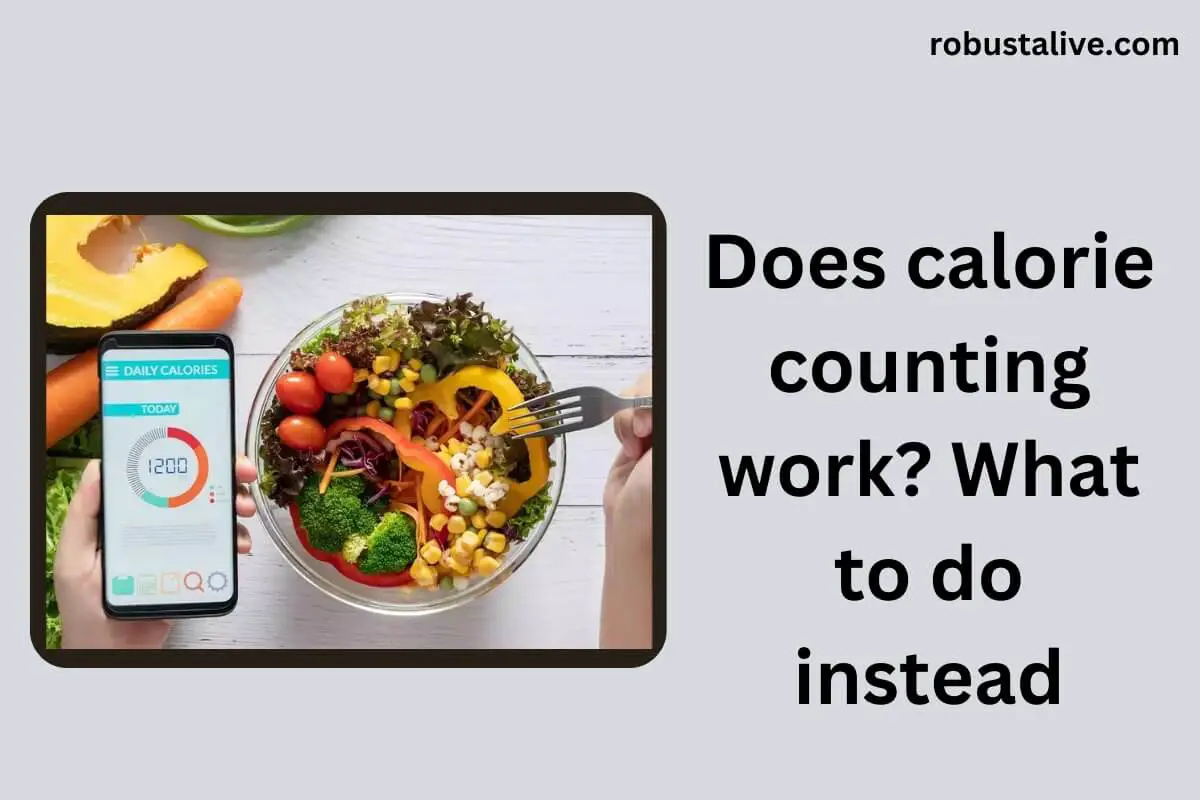Does Calorie Counting Work? What to Do Instead?

Wondering does calorie counting work or not? You are not alone in this confusion. Some people insist on its efficiency as they say it works on the principle of the calories you are taking in vs. taking out. At the same time, some believe that this method needs to be updated and worked. Besides, it can even result in weight gain.
Calorie counting can be beneficial for short-term weight loss; for some people, it may work long-term. But for most people, this method fails and eventually does more harm than good. Especially for starters, it can be challenging as it can deprive you of enjoying your food and turns it into a tedious exercise of food weighing.
The science backs both sides, which makes the matter even more confusing. This article will give you a critical look at the evidence to provide an answer to the frequently asked question; “Does calorie counting work?”
What is a calorie?
According to the U.S. Department of Agriculture (USDA), a calorie is an exact unit of energy. It’s the energy you need to increase the 1g water temperature by 1 degree Celsius. The calories in food are the kilocalories or 1000 of these tiny units.
Fats are the most calorie-dense food, with around 9 kilocalories per gram. Protein and carbohydrates each have about 4 kcal per gram. On the basic level eating few calories than you burn results in weight loss.
How does your body use calories?
If you think about why calories matter, then first understand the importance of calories in your body. It starts with the food you are eating. Foods and beverages provide your body with the calories it needs for functioning. These calories come from the three main micronutrients.
- Fat
- Protein
- Carbohydrates are also known as the carbs
Our body breakdown the food we eat into small units during digestion. These subunits benefit in making the new tissues and provide the body with the energy it needs. The amount of energy our body gets from the subunits depends on their origin:
Carbs: 4 calories in a gram
Fat: 9 calories in a gram
Alcohol: 7 calories in a gram
Protein: 4 calories in a gram
Our body uses the calories produced during the metabolism to power the three main processes of the body described below:
Metabolism
Our body produces the calories to perform essential functions like providing energy to the:
- Lungs
- Heart
- Kidneys
- Brain
- Nervous system
The total amount of energy our body requires to support the body’s functioning is called the BMR basal metabolic rate. It’s sometimes also known as the Resting Metabolic Rate, the total calories your body spends during the resting phase for its survival needs. RMR or BMR makes up the most significant proportion of daily energy requirements.
Digestion
Our body uses the calories we take from food for digestion and metabolism of the foods we eat. It is known as the thermic effect of food. For example, protein needs more energy for digestion as compared to fats.
About 10% of the calories we take from our daily meals are used to support the TEF.
Physical activity
The remainder of the calories we get from food benefit physical activity. It includes both everyday tasks and daily workouts. Therefore the number of calories you need for it will differ from person to person and day to day.
How many calories are in a pound of fat?
There are 3500 calories in 1 pound of fat. So, if you are setting a goal to lose one pound in a week for about 16 weeks, then you must follow a calorie deficit diet of 3500 calories for 16 weeks. It’s pretty doable.
An efficient way to do this is by:
- Sunday to Thursday school nights aim for 500 calories in a day
- Friday and Saturday can be the cheat days so you can have 500 extra calories on these two days.
If you follow this plan, you will be in the range of 3500 calories deficit over the week.
Counting calories
Does calorie counting work? The best way of tracking the calories is by counting them. It’s easier than you think. Besides, you can be flawed at counting calories. You have to be honest with yourself to accumulate the information you are getting with time and take a close guess on the calorie count.
Honesty is vital while noting your calories as it can help avoid overeating when you know you don’t have the space for it. It’s a perfect strategy, especially for people who eat the same things a lot and are not very interested in trying new things.
Once you figure out the calories for your favorite foods, you are already halfway there. You will start believing in this strategy, which might work wonders for you. But in the initial stage, you do have to work hard.
Not all calories are equal
The simple question of whether the calories obtained from carbs, fat, and proteins are equal is quite controversial. As the answer depends on the way, you look at it. Just like pounds and inches, calories are a measurement unit.
If you look from the weight loss point of view, 500 calories are the 500 calories, whether from an apple or a donut. However, in terms of calories are different. It’s vital to point out the difference between quality and quantity.
Foods with the exact count of calories can have different nutritional values and a significant difference in their impact on health. Besides, nutrition-rich fruits and vegetables are related to lower mortality risk.
Not only the fruits have a different impact on health, but they also have different outcomes on appetite, hormones, and hunger levels. For example, eating 100 calories from apples will diminish hunger, while eating 100 calories from donuts will not. Therefore eating donuts can result in overeating and making your weight loss goal more difficult.
Why You Shouldn’t Count Calories?
Have you ever been on a calorie-restrictive diet in which you have to keep track of your calories daily? Your answer is probably yes as you are reading this! Well, I am glad you are reading this as this article will clear all your confusion regarding “Does calorie counting work? ”
It can work for the short term but think about it it could be more realistic to count every single calorie you eat every day around the year for the complete life. Calorie counting doesn’t support a balanced lifestyle but can result in guilt, confusion, stress, and feeling overwhelmed over food.
You must be surprised, but the registered dietitians don’t recommend it as they don’t find it supportive enough for personal health goals.
Counting calories isn’t a practical option
Many times we are not in a position to keep track of every ingredient’s calorie count, as we don’t have the measuring cups, or most probably, you need to know the dish’s ingredients. You can have a family gathering or a friend’s day out where you eat foods that don’t even have a label.
That’s how daily life is. Counting calories in everyday life is a challenging option. You will start getting frustrated with it. Think of a situation in which you have familiarized yourself with the calorie counting rating, but what will happen when you go to social gatherings?
Generally, people who are counting their calories try avoiding social gatherings altogether and refrain their selves from eating outside. But even when they go out, they regret their meal and become stressed and frustrated. In simple words, it’s just not a practical option.
You start ignoring your body’s needs
Our body sends us signals to tell us about what it needs. The satiety and hunger signals are a few examples of your body telling you about its needs. When you are hungry, it means you to eat something and tells you to stop before you start feeling over-stuffed.
When you try following the strict portions diet, you become unaware of these signals that result in overeating or under-eating. Many things distract you from your body’s needs as you focus on external factors. It includes:
- Fasting
- Having a specific portion size diet
- Counting calories
- Eating till your plate is completely clean
- Counting macronutrients
Our body desperately needs mindful eating in which you listen to the needs of your body. With mindful eating, you develop a strong mind-body connection that motivates you to eat healthily without judgment. It also allows you to know what is working for your body. In this way, you start accepting that every person has a different body and that what works for one might not work for the other.
That’s why so many plans, diets, and trends stop working.
It Overlooks Nutritional Value

Graphics Credit: Robustalive.com
Calories can only tell if the item is nutritious. It’s that simple. Following a calorie counting approach, you can quickly eat 2000 calories of anything. These calories can come from processed, whole, and packaged foods.
Foods can be the same concerning calories, but there can be a drastic difference when it comes to nutrition. Our body does need calories, but it also requires minerals, antioxidants, and minerals. Looking at calories from the number is unhealthy as you need to pay attention to the quality, which is a significant contributor to health.
Besides, counting calories can result in avoiding the most nutritious food as they are calorie-rich. When you start counting calories, you don’t see the cashews and avocado as nourishing and filling nutrients but as high-calorie food.
Disorder eating behaviors
The experts notice while working with clients that they inadvertently have an unhealthy relationship with the foods they are eating. In some cases, this can present itself from such disorder eating behaviors.
Unfortunately, unhealthy eating behaviors are socially acceptable as the norm. We do not realize the leading cause behind this and the effect it can have on health.
Here are some examples of the disorder’s eating behaviors
- Yo-yo dieting
- Skipping meals
- Making up for the wrong foods by burning the extra calories with exercise
- Keeping pace with the nutrition trends
- Obsessing over body image and a weight
- Extreme shame or guilt feeling after eating
- Rigid nutrition and fitness routines
- Becoming out of control in front of food
When you are counting calories, it can become challenging to maintain healthy eating habits. As you focus entirely on estimating the daily calories, you forget to consider the quality of your choices.
When you become so controlling over your food, you are becoming out of control. You will feel healthy eating is a daily challenge. It can harm your mental and physical health.
Conclusion
Eating fewer calories than you burn daily is essential to losing weight. Some people manage to achieve it even without counting their daily calorie intake. Some think counting calories is vital to maintaining a specific count for effective weight loss.
People who want to try this method should keep in mind that counting calories are different in terms of health. Besides, it can also affect weight loss due to other factors like hormones and appetite.
Therefore while making a menu, try adding nutrition-dense foods instead of processed foods. Make choices on something other than the calorie count, as counting calories can create an unhealthy relationship with the food, especially for people already facing issues in their diet management.
Suppose you find that tracking then calorie intake can trigger negative feelings like shame or guilt. You can adapt the other methods like intuitive eating. Talk with your healthcare provider to help you understand does calorie counting work for you.
FAQ’s
Is calorie counting beneficial for losing weight?
Yes, calorie counting does benefit many people in losing weight. Many studies show that recording your physical activity and food intake help in achieving weight loss goals.
Should I focus on healthy eating, or must I count calories?
According to the studies paying attention to healthy food is more beneficial for weight loss than just counting calories. The Stanford University Researchers found no significant difference between the weight loss between a healthy low-carb diet and a healthy low-fat diet.
How many calories should I take for weight loss?
To lose one pound a week, try reducing your calorie intake by 500 calories and do at least 30 minutes of exercise daily. However, the daily calorie count should stay within 1200 for women and 1500 for men. Exceptions can be made if you follow them under a specialist’s supervision.
Should I trust the calorie calculator?
All calorie calculators can only provide estimates of your daily calories. But they give you a starting point, and sometimes it may need to be more suitable. You only know these numbers are correct by continuing the guidelines for a few weeks and then seeing what happens.
Are 1000 calories per day enough?
Everybody needs 1000 calories per day through essential biological functions like building new tissues and replenishing the hormone level. Daily activities like walking, gardening, and cleaning can benefit in burning several calories daily.
References
https://www.healthline.com/nutrition/does-calorie-counting-work#calories-and-losing-weight
https://www.everydayhealth.com/diet-nutrition/can-calorie-counting-help-you-lose-weight/
https://www.health.harvard.edu/staying-healthy/stop-counting-calories
https://www.webmd. com /diet/features/dos-donts-counting-calories
https://www.aleanlife. com/counting-calories-works/
https://www.popsci. com/health/calorie-counting-apps-accuracy/





